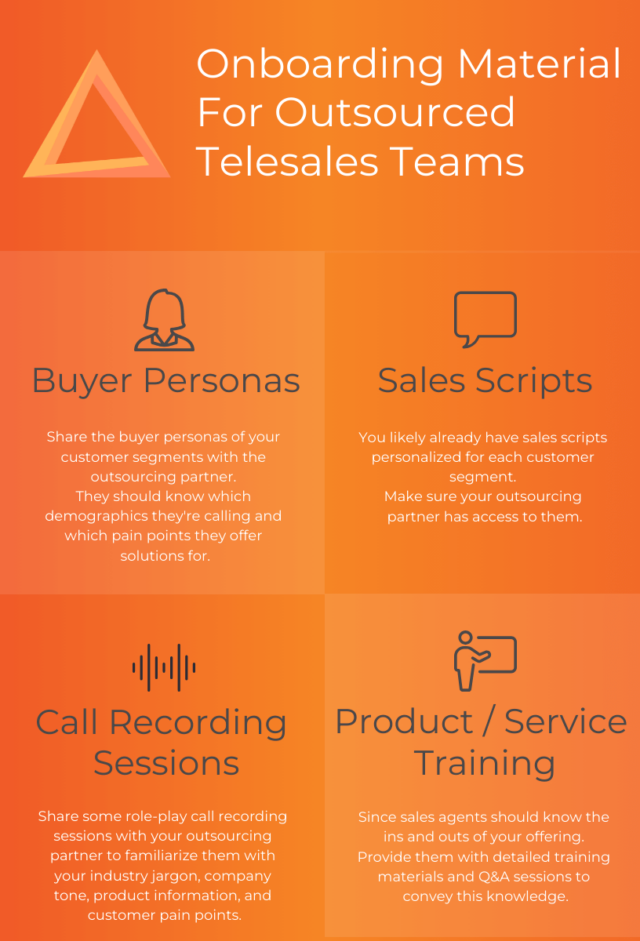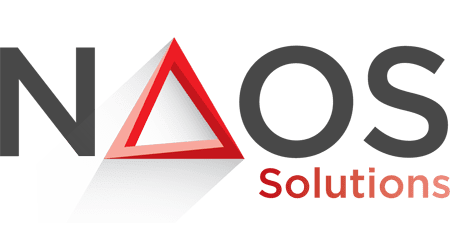Outsourced telesales services are more than just a cost-effective alternative; they are a strategic tool that can significantly boost lead generation and conversion rates when properly aligned with your sales goals. With the outbound telemarketing market projected to reach $14.1 billion by 2031, sales outsourcing will give the most advanced companies a serious competitive edge.

But success doesn’t come automatically. In this article, we’ll explore how to ensure your telesales outsourcing partner is not just a vendor but an integrated extension of your sales team. Following the simple yet demanding steps described in this article will maximize your ROI and maintain the integrity of your brand’s messaging. Get ready to transform your outsourced telesales approach into a powerful driver of your business growth.
IDENTIFYING AND COMMUNICATING SPECIFIC SALES TARGETS
Define Your Sales Goals
This begins with setting a goal that aligns with your broader business objectives. Whether your focus is B2B or B2C, these goals should be tailored to the unique needs of your market and sales strategy.
Examples of Sales Goals:
- Lead Generation: For businesses aiming to build a pipeline, the goal might be to generate a specific number of qualified leads within a given timeframe. For example, a B2B company might target generating 50 leads per month from decision-makers in critical industries, while a B2C company might aim for 200 monthly consumer leads in a specific demographic.
- Appointment Setting: If your business relies on in-person or virtual meetings, your telesales goal might be to schedule a certain number of appointments. For instance, a tech firm might aim to set 15 product demo appointments weekly, or a service provider might seek to book 10 consultations per week.
- Direct Sales: When the goal is to close sales directly over the phone, you might target a certain revenue amount or number of units sold. A B2C retail company could aim to sell 100 new product units weekly, while a B2B service provider might target closing $50,000 in new contracts monthly.
- Customer Retention/Win-back Campaigns: Another goal could be to retain existing customers or win back lapsed ones. For example, your objective might be to achieve a 20% success rate in reactivating dormant accounts within a quarter.

Define What Is A Lead For You
Once you’ve established your sales goals, it’s crucial to define lead criteria—the specific characteristics that qualify a prospect as a viable lead for your business. This helps ensure that your telesales efforts are focused on the right targets, avoiding wasted time and resources.
What is Lead Criteria?
Lead criteria refer to a prospect’s attributes or requirements to be considered a qualified lead. These attributes can vary depending on your sales goals and industry but generally include factors such as:
- Demographics: Age, gender, income level, or geographic location for B2C, and industry, company size, or job title for B2B.
- Behavioral Indicators: Previous purchase history, level of engagement with your brand, or responses to previous marketing efforts.
- Budget: The financial capability of the lead to afford your product or service.
- Decision-Making Authority: Whether the lead has the authority to make purchasing decisions.
Among these criteria, specify which are a MUST and which are NICE-TO-HAVE.
You must also define the negative criteria that disqualify a prospect from being considered a lead. For instance:
- Leads outside your target geographic region.
- Prospects with insufficient budget.
- Contacts without decision-making authority.
Clearly defining these criteria is essential to ensure your outsourcing partner can efficiently filter out unqualified leads and focus on high-potential prospects. This alignment helps prevent the team from wasting time (and your money) on leads that are unlikely to convert, thereby maximizing the effectiveness of your telesales efforts.
Once your lead criteria are defined, you must communicate them to your outsourcing partner. Ensure they understand what constitutes a qualified lead and the rationale behind these criteria.
Define Your KPIs
Next comes the identification of sales targets. In this step, you break down your goals into tangible key performance indicators (KPIs) that you can monitor for performance analysis of your outsourcing partner.
KPIs are measurable values demonstrating how effectively your telesales efforts achieve your business objectives. Unlike general goals, KPIs are specific metrics that track performance over time.
Examples of Relevant KPIs for :
- Call Volume: Track the number of calls made per day or week. If each agent is expected to make 100 calls daily, you can monitor adherence to this standard.
- Conversion Rate: Measure the percentage of successful outcomes from those calls. For example, how many of those 100 daily calls result in scheduled appointments, closed sales, or lead generation?
- Lead Qualification Rate: Evaluate the quality of leads generated. For instance, out of 100 leads generated, how many meet the criteria of being sales-qualified (e.g., budget, decision-making authority)?
- Revenue Per Call: This KPI measures the average revenue generated from each call, helping assess your telesales efforts’ financial efficiency.
Once your goals, lead criteria, and KPIs are clearly defined, you must communicate them to your outsourcing partner. This ensures that everyone is aligned and working towards the same objectives, maximizing the effectiveness of your telesales efforts.

Here’s an example of what it could look like:
Sales Goal: Close 5 deals in a month
KPIs: 100 calls per agent per day, resulting in:
- At least 10 appointments scheduled
- At least 2 converted sales
Lead Criteria: Decision-making authority and budget of $20,000 or more
VETTING THE RIGHT OUTSOURCED TELESALES PARTNER
You may have perfected your goals and KPIs calculations but won’t approach the desired results if your outsourced telesales partner isn’t competent. When you’re in the partner selection phase, here are some things to look for:
- Outbound B2B Cold Calling Expertise: The essential qualification is whether the company specializes in outbound B2B cold calling. They should be well-versed in techniques like value-based selling and consultative selling. If you require industry-specific expertise, like knowledge of a specific product, ask for it.
- Understanding of CRM Systems: Your outsourcing partner should be familiar with customer relationship management (CRM) systems and adept at using them to track leads, calls, appointments, and conversions. It’s not just about making calls but also about managing the entire process efficiently.
- Quality + Quantity: The outsourced telesales service should be able to handle high-volume calling and do it with quality. They should have a stringent quality control process to prevent mishaps.

Most telesales partners will boast about their capabilities, but you must verify their claims. Customer testimonials and case studies are a great place to start. You can also check third-party review sites to see what others are saying about their experiences with the company.
STRATEGIC ONBOARDING: EQUIPPING THE TELESALES TEAM
After selecting an outsourcing partner, you’re set to onboard them. You should provide them with all the necessary resources to fit into your sales process.

Here’s what you should share with them:
- Buyer Personas: Share the buyer personas of your customer segments with the outsourcing partner. They should know which demographics they’re calling and which pain points they offer solutions for.
- Sales Scripts: You likely already have sales scripts personalized for each customer segment. Make sure your outsourcing partner has access to them.
- Call Recording Sessions: It’s best to share some role-play call recording sessions with your outsourcing partner to familiarize them with your industry jargon, company tone, product information, and customer pain points.
- Product or Service Training: Since sales agents present your product or service as a solution to the people they call, they should know the ins and outs of your offering. Provide them with detailed training materials and Q&A sessions to convey this knowledge.
Onboarding is just the first step in the process. You must keep updating and refining your sales material based on customer feedback. For example, the sales scripts will need tweaking as new pain points emerge.
BEST PRACTICES FOR MANAGING DAILY TELESALES OPERATIONS
Now that everything is up and running, you can concentrate on maintaining high-quality telesales operations. Here’s how to ensure that with your telesales partner:
- Conduct regular data analysis to optimize call strategy, call frequency, product pitch, sales targeting, and sales scripts.
- Track pre-specified KPIs and revise their evolutions during frequent meetings (at least monthly meetings).
- Monitor the outsourced team’s follow-up activities to ensure they stay on top of leads.
- Share sales performance reports with the outsourcing partner to keep them motivated.
- Conduct customer satisfaction surveys regularly to gauge the effectiveness of your telesales team and share the results with your outsourcing partner for continuous improvement.

ALIGNING TELESALES MESSAGING WITH SALES AND MARKETING
A common issue with outsourcing business tasks is the misalignment of messaging and objectives. Your outsourcing partner may not fully sync with your sales strategies, creating a disconnect in messaging that can confuse prospects and reduce the effectiveness of your campaigns.
Training on Brand and Product Messaging:
To avoid this, ensuring that your telesales partner is fully integrated into your overall sales and marketing strategy is essential. This means more than just providing them with sales scripts—it means creating a cohesive, unified approach across all customer touchpoints.
You should train your partner team on your brand’s tone of voice, company culture, language, jargon, company values, and unique selling points. Even better, share your sales and marketing materials with them. This includes product brochures, FAQs, customer testimonials, and other content that could help the telesales team understand and effectively communicate your value proposition.

Communicating Promotions and Marketing Actions:
One of the most crucial aspects of alignment is ensuring that your telesales team is fully informed about any ongoing promotions, marketing campaigns, or special offers.
Whether launching a new product, offering a limited-time discount, or running a seasonal campaign, your telesales partner must be informed promptly and thoroughly.
Why This Matters:
Promotions and marketing actions are powerful tools for driving sales, but their effectiveness hinges on consistent communication across all channels. If your telesales team isn’t aware of a promotion, they might miss opportunities to close sales or, worse, provide outdated or conflicting information to prospects.
How to Implement:
- Real-Time Updates: Establish a system for real-time updates on promotional activities. This could involve regular briefings, shared calendars, or access to your internal marketing platform, which lists all current promotions and campaigns.
- Detailed Briefings: Before any promotion goes live, provide your telesales partner with a detailed briefing. This should cover the nature of the promotion, the target audience, the expected outcomes, and how it fits into the broader sales strategy. For example, if you’re offering an early bird discount on a new subscription tier, ensure the telesales team knows the specifics—who it’s for, how long it lasts, and how to pitch it effectively.
- Integrated Campaigns: Whenever possible, align your marketing campaigns with your telesales efforts. For instance, if a digital marketing campaign drives traffic to your website, you should prepare the telesales team to follow up with those leads using messaging that complements the campaign.
- Feedback Loops: Encourage a feedback loop between your marketing and telesales teams. The telesales team can report on how prospects respond to promotions, providing valuable insights that can help refine future marketing strategies.
The key is for your telesales script and marketing messaging to complement each other. Whether you want to highlight your product’s unique selling points or a specific feature, let your telesales partner know how to sell it.

CONDUCTING REGULAR OUTSOURCED TELESALES SERVICES PERFORMANCE REVIEWS
Regular performance reviews are essential when outsourcing telesales to ensure your partner meets your expectations and achieves the desired outcomes. These reviews should be thorough, data-driven, and tailored specifically to the nuances of outbound sales.
Key Components of an Effective Performance Review:
- Real-Time Call Monitoring:
- Access to Live Calls: To get an accurate sense of your partner’s performance, request access to real-time call listening. This allows you to evaluate how telesales agents interact with prospects, handle objections, and follow the sales script.
- Immediate Feedback: Listening to live calls provides the opportunity for immediate feedback. If you notice any deviations from the desired messaging or sales strategy, you can immediately address them, ensuring that the telesales team stays aligned with your goals.
- Call Recording and Archiving:
- Call Records Retention: Require your outsourcing partner to keep records of all calls for at least three months. This enables you to review past interactions, identify trends, and address any issues arising after the initial contact.
- Regular Audits: Schedule regular audits of these recordings to assess the quality of interactions. Focus on key metrics such as tone of voice, adherence to the script, ability to address customer concerns, and overall professionalism.
- Quality Assurance (QA) Templates:
- Custom Listening Templates: Create a detailed listening template for your Quality Assurance (QA) department. This template should outline the main criteria to evaluate during call reviews, such as:
- Script Adherence: Ensure that agents follow the approved sales scripts and do not deviate into unapproved areas.
- Objection Handling: Assess how effectively agents handle objections, guiding the prospect toward a positive outcome.
- Tone and Engagement: Monitor the tone of voice, ensuring it aligns with your brand’s values and is engaging for the prospect.
- Closing Techniques: Evaluate how well agents can move the conversation towards a close or the next steps, whether setting an appointment or securing a sale.
- Custom Listening Templates: Create a detailed listening template for your Quality Assurance (QA) department. This template should outline the main criteria to evaluate during call reviews, such as:
- Data-Driven Performance Metrics:
- KPIs and Metrics: Regularly review key performance indicators (KPIs) such as conversion rates, lead quality, and call volume. Compare these metrics against your pre-defined goals to assess how well your telesales efforts are performing.
- Sales Funnel Analysis: Analyze where prospects drop off in the sales funnel. This can reveal weak points in the telesales process that need improvement, whether in initial engagement, follow-up, or closing.
- Feedback and Continuous Improvement:
- Collaborative Feedback Sessions: Conduct regular feedback sessions with your telesales partner. Share insights from your performance reviews and collaborate on strategies for improvement. Ensure to involve the agents in these discussions, as their firsthand experience can provide valuable perspectives.
- Training and Development: Based on the performance reviews, identify areas where additional training might be needed. This could include refreshers on the sales script, objection-handling techniques, or product knowledge.
- Continuous Monitoring and Adjustments:
- Ongoing Performance Tracking: Monitor performance metrics closely over time, making adjustments as necessary to improve outcomes. For example, if you notice a drop in conversion rates, investigate the cause and work with your partner to refine the sales approach.
- Incentive Programs: Consider implementing performance-based incentives for your telesales partner. This can motivate the team to strive for better results and ensure that they are as invested in your success as you are.
Implementing a comprehensive and detailed performance review process can help you maintain high standards in your outsourced telesales efforts. This approach ensures consistency and quality and allows for continuous optimization of your telesales strategy, leading to better results and a stronger partnership with your outsourcing provider.
MAXIMIZING TELESALES ROI THROUGH DATA-DRIVEN DECISIONS
Telesales outsourcing helps cut costs since you’re not managing everything in-house. But that’s not enough; you also want to maximize the return on investment (ROI).
Data is your ally when it comes to ROI maximization.
Start by collecting call data, such as the duration, outcome, and hang-up rate. Then, analyze this data to find patterns and trends. Are there specific times or days when you get better customer responses?
Which sales scripts have the highest conversion rates? Are there any common objections that sales agents struggle with? Do some customer segments respond better than others?
The answers to these questions will provide you with steps to optimize your telesales strategy. For example, customers in a specific geographical region or industry are more likely to convert. => You concentrate your efforts on this particular target.
Similarly, if a specific script variation leads to more conversions than others, use it more frequently.
If possible, set up performance-based contracts with your telesales outsourcing partner, incentivizing them to strive for better results. You’ll only pay for actual conversions, not just calls made or “occupied seats.” You can work out a payment mode that pays your partner a base compensation and a bonus if they surpass a specific sales target.
CONCLUSION
Summing up, outsourced telesales services can undoubtedly bring several benefits to your business, from cost-cutting to increased efficiency and scalability. However, these advantages only manifest with a data-driven and brand-aligned telesales strategy. Plus, there should be sufficient communication between both parties to drive results.
Regular performance monitoring and KPI tracking further seal the deal, providing a clear picture of what’s working and needs improvement. Most importantly, you need a telesales partner that shares your vision and can meet expectations.
NAOS Solutions has been doing that for over a decade, taking telesales off your hands to give you more time for core business operations. We do it from lead generation and appointment setting to client conversions and upselling.
Contact us to see our commercial development expertise in action.

